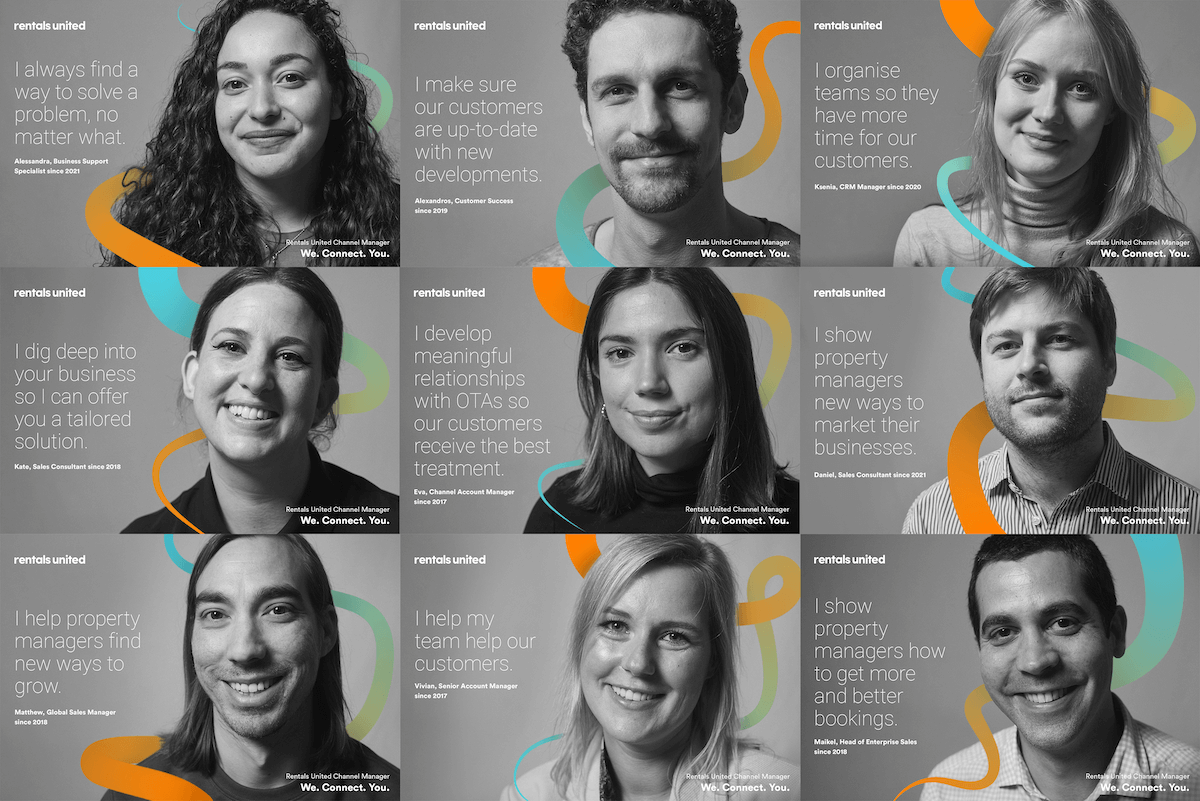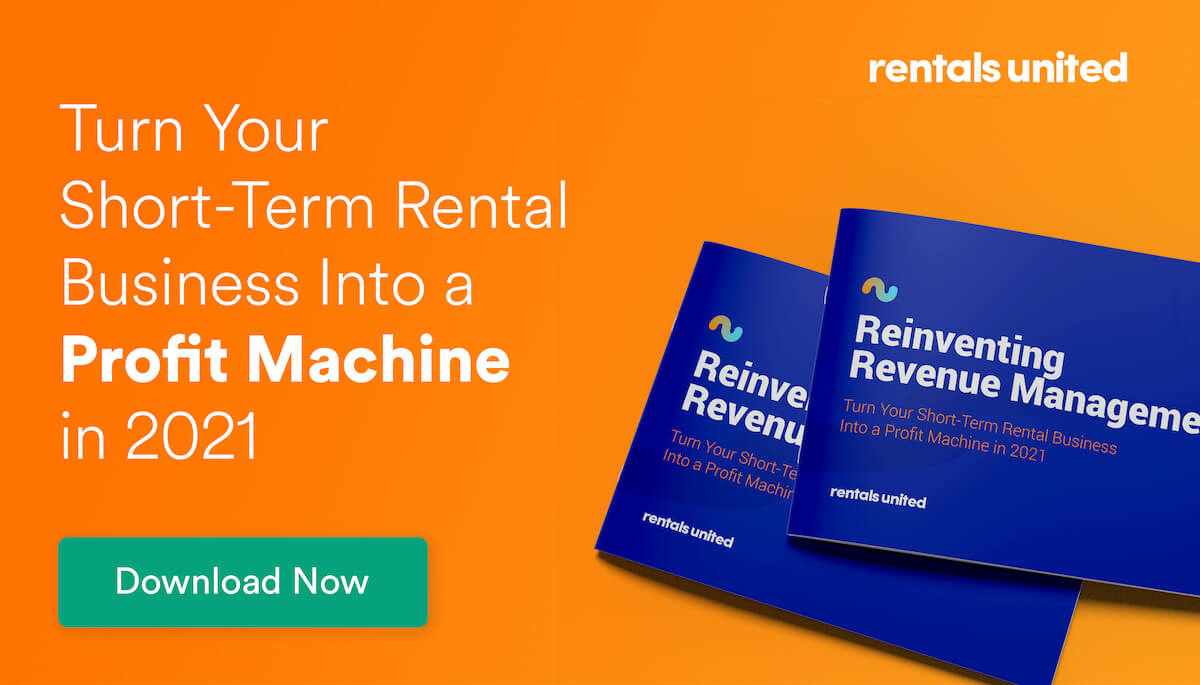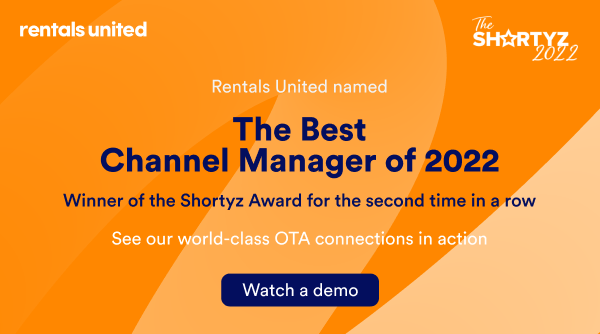Highway to Scale is a podcast hosted by Dorian Derezic, where he explores the ins and outs of business success and discusses topics like validating business ideas, exploring different management styles, building products, launching them on the market, raising capital and scaling your business.
He recently interviewed the CEO of Rentals United, James Burrows. They talked about ‘What is the lifeblood of every SaaS business” covering topics such as:
- How to maximise the value your customers get from your product or service.
- Why sales are the lifeblood of any company.
- Why it’s essential to stay focused and continuously re-evaluate your KPIs.
You can listen to the episode on Anchor, Spotify or read on to find out more.
A brief history of Rentals United
Rentals United was born out of four competitors coming together in an effort to compete with Airbnb. What started as a property sharing platform turned into one of the first channel managers in the vacation rental sector. After three years of bootstrapping, Rentals United raised two seed rounds and a series A funding round to fuel its growth. Read more about the story of Rentals United.
Dorian Derezic: Looking at your company today, what makes Rentals United better than your competitors?
James Burrows: We’re in a unique position in our industry. We don’t have many direct competitors. There are a few in the US that really focus on the US market. There’s one in Holland that’s probably more geared towards large, enterprise property managers. Rentals United kind of sits in the middle with a more global reach.
What makes us different? I mean, our focus is SaaS based. We charge a monthly fee per month per property, which seems to fit into our customers’ budgeting because we have a wide cross-section of customers.
We have a wider distribution of channels. Especially in Europe, it’s not just Airbnb and Booking.com. There are a lot of local channels that can offer you access to a more local market.
We also focus on data and providing ROI advice. What’s the data that we’re seeing? How can you make more money out of the same kind of reservation? So it’s a bit of revenue management, content improvement, and really focusing on return investment.
The most important aspect of business when it comes to acquiring new leads is sales. Is it true with your company, too?
Sales are probably the most important part of every business. Otherwise, you’re not going to survive long! From our perspective, it’s sales and product development. We’re a software house after all.
Sales are crucial, but I think they also need to be aligned with marketing. We focus on driving leads and opportunities into the business through marketing, from social to organic, paid, and email marketing. From more outbound, more aggressive tactics, we have sales guys calling up potential partners, networking and going to events.

Going through the history of Rentals United, can you tell me about some of the more impactful milestones? And some of the mistakes you made?
There have been a few mistakes. I think probably our biggest mistake was not listening to our customers as much as we should have. The nature of Rental United is quite a specialised product that is geared towards more sophisticated property managers, the ones that aren’t just looking at connections but deeper. They use different types of products, but they also react in a completely different way.
We felt that we could create a product that fits owners and the typical Airbnb host too. But they act more like a consumer when they do business. We really underestimated what they wanted and how they would interact with the business. So we were spending a lot of money bringing them in, and they were churning within three to six months.
The second mistake, I suppose, was the product decisions that we’ve made. We have been great at developing products and not so good at going through that reiteration of updates, improving, listening – the loop that you should have when you focus on products. We’ve only become more product-focused over the last two to three years, identifying the fundamental questions that our customers have, what sort of improvements you can make and how you can develop them.
In terms of milestones, it was undoubtedly pivoting to become a SaaS business. We were a business that generated revenue through transactions. So every booking that came in, we were earning a commission. We pivoted to become a SaaS business in 2018, and thankfully, we did!
This enabled us to get through the last 14 months relatively unscathed, which was great. It really fits into our market, we believe. And since the pivot will be moving away from that long tail towards your more enterprise-level customers and more focus on integrations rather than developing tools for our smaller customers.
You’ve gone through a couple of rounds of funding. What were some of your goals when you decided you want to get outside capital? What kind of investors were you looking to attract?
It really depends on the position you’re in. We still have some very understanding and generous Angels who are still board members.
But there was always something missing as we started to grow and get bigger. You need advice from companies that have a deeper understanding of what you do. Running a SaaS business is very different from running other businesses. There’s a big focus on metrics on making sure that your SaaS metrics are working.
So our Series A was a combination of two companies. One was a Swedish VC, they had a lot of experience working with SaaS businesses, and they’ve provided a lot of help in terms of how we can really understand, finetune and make the most out of the data that we’re seeing.
Secondly, the other VC was more from a travel base. They were very good at benchmarking and challenging particular ideas that we had because they knew the industry so much more.
In fact, we will be looking again to go through another round, probably at least within the next twelve months. And now we’re thinking about a completely different company, someone more strategic.
What do you think about what some CEOs say when you’re just starting out: Don’t look at the amount of money that someone is willing to invest in you. But look at the people who are behind that money, if they can teach you how to grow your company.
Sure. But I think money is important as well. It has to be a balance between the two. That the valuation you get as a founder is going to be vital with every single stage that you go through, and getting value for money and fighting for that is really important.
Many people can open doors for you, and that’s really great. But how many investors out there can create that level of return? I haven’t come across any, but I’m sure they’re out there. I would always think that there’s a balance between the two.
Can you tell me more about your management style when it comes to building teams, hiring people?
Businesses are only as great as the sum of the people. As you grow and have more money, you start to understand the benefit that good people can bring to the business. So try and afford the best that you can and understand the positions that you really need.
For my management style, I’m definitely a macro style. I think that people need to be empowered. I don’t like the word, but I think that they need to be independent. They need to understand, and they need to be able to make their own decisions and be challenged.
But equally, I’m very happy for people to challenge me. Overall, there needs to be people that really understand the company’s overall vision, and they’re able to share and empower that vision in people within their teams.
We’ve dabbled in a number of different methodologies within RU. One, we run an agile and scrum-based process in our product development. We’ve tried to simulate that within the rest of the competencies within the company, which has not been as easy as I thought it was going to be.
We’re almost like a conveyor belt of departments within the company. So you’ve got product first, marketing, sales, onboarding, growth, account management and renewals. And it goes in this big circle continuously, and it requires a lot of collaboration. We’re really trying to encourage that, and we thought that the agile system would be able to apply that quite easily to the business side.
That’s not always the case, but it’s really about making people feel responsible for what they’re doing. They understand the company’s overall objectives and know that they can all make a difference.

When it comes to you specifically and your work, what are you focused on the most? Do you get involved in operational day-to-day stuff?
Yeah, I have to. I was the COO for a time before becoming CEO. Our CEO left and I didn’t replace him because I didn’t feel that we needed that sort of position at the time. I’m still involved, in fact, I’m involved in a big project from an operational perspective right now.
But, you know, ideally, my focus should be on people, money and strategy. But that’s not always the case. We’re still growing from a start-up into an SMB.
So there’s still quite a hands-on feel. I like to get involved, and I like talking to customers and finding out what’s going on. As a CEO, you need to understand every aspect of the business.
What are some of the biggest challenges of building a SaaS company? Where are things breaking?
The biggest challenge, in the beginning, is the money side, because you tend to have a really high cost curve and the returns are really low because your customers are paying you less money, but on an ongoing basis. The key is volume of customers that start building up over a period of time.
Managing money is key. Normally, it takes between six to twelve months before you really start to see a nice growth curve and your costs start to come down.
The second challenge is churn. Retaining your customers and obtaining your revenue is the one thing that can erode a SaaS business. It kills you in terms of your long-term growth and your short-term.
We’re in a challenging position because we don’t just develop products. We are also very dependent on all of our partners. We have 80-odd channels, we have 50 PMS partners and around 250 API connections.
All of these can have an impact on our client satisfaction. Whilst there could be a problem created by a channel, the client will always blame us because we’re the ones responsible for the reservation. So it’s been super challenging to work on improving processes and integrations, having a better relationship and knowledge shared between us and our partners and equally getting the client to understand that it’s not that easy. We are doing something highly complex and there needs to be a level of understanding.
At the same time, I completely understand. We manage reservations, which is the lifeblood of the industry. And if the reservations are not coming in right, then it’s going to hurt. Our market is full of family-size businesses and is highly fragmented. So one or two bookings extra a week can make a really big impact on their profit.

What advice would you give to, let’s say, new startup owners who are just looking to launch their businesses or launch their products on the market? What can you share?
Bootstrap for as long as you can. The longer you go without funding the better because you’ll become less reliant on the money. When you’re fundraising, it can take a lot of time and focus away from what you really should be doing. And secondly, there’s always going to be a question about dilution with founders. We’ve been around for seven years, so there will always be that founder investment kind of conflict.
I would also say going back to listen to your customers. I would develop a minimal range of products, test it out on them, and talk to them continuously. Try and focus on something that is solving an issue. If you can do that, that’s great. Set some KPIs right from the start and continuously evaluate them.
Some of the best advice I’ve ever had was from one of our Angels. He said: write down exactly what you’re meant to be doing as a company on the blackboard. And every time you get a phone call and someone says, “Hey, l have a fantastic idea”, if it’s not on that board, you need to say “That is a great idea, but let me come back to you in six months.”
Focus, focus, focus. It’s everything.
What can we expect from you and your company in the next period?
At the moment, we are doing a lot of stuff in terms of strategy and starting to think about where we’re going. We have not been quite ready to think about exit up until recently. That’s probably a three-year plan now.
From a channel management perspective, our product is being commoditised, as it has done in the hotel sector. What we’re charging now is definitely half of what we were charging before.
What we need to start thinking about is how we can get higher up in the value chain. How can we integrate ourselves deeper into the ecosystem and become a crucial part of it?
We obviously are because we generate bookings. There’s no replacement for that. But for us, it’s developing tools to help our partners help their customers. It’s helping our channels get access to better quality content, better quality products to drive further conversion. And how can we further integrate ourselves into our partners?
Disclaimer: The interview has been edited for brevity. You can listen to the original Highway to Scale podcast episode on Anchor or Spotify.

